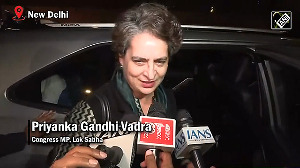Notwithstanding Taliban's insistence that militant commander Ilyas Kashmiri is dead, senior Pakistani military authorities in South Waziristan tribal region are still reluctant to confirm that he was killed in a US drone strike over a year ago.
"We, on our own level, did some investigations but could not find any clue that could prove his death in the drone attack. We knew that he had arrived in Wana a few days before the June 4 drone attack (last year)," an unnamed Pakistani army official told 'The News' daily.
Pakistani Taliban militants, particularly those considered close to Kashmiri, who was linked to the 2008 Mumbai attacks, claim that he was injured in the drone strike at Shokai Narray village, located near the towns of Karikot and Ghwakhwa, on June 4, 2011.
They claim he subsequently died in another drone strike conducted a week later at Danna village near Wana.
Senior commanders of the Taliban faction in South Waziristan led by Maulvi Nazeer said Kashmiri travelled a few days before his death from Mirali in North Waziristan to Wana.
He made the move on the advice of friends due to frequent drone attacks in Mirali that killed a number of his fighters.
They said Kashmiri held a meeting with Maulvi Nazeer in Wana and then left for Azam Warsak, where the Punjabi Taliban had camps.
The militants were targeted by drones at Shokai Narray on June 4 last year.
Kashmiri was injured while 12 others were killed, including members of the Punjabi Taliban and some belonging to the Ahmadzai Wazir and Afridi tribes.
Kashmiri was first taken to a private health facility in Wana and then shifted to Azam Warsak area, where he was living with his fighters in an old house at Danna village that once housed Afghan refugees.
"He had spent almost a week at a mud house in Danna village to recover from his wounds suffered in the first drone attack, when a drone fired two missiles and hit the same house in which Kashmiri was staying. He was killed along with four to five other people, all hailing from Punjab," a senior unnamed commander of the Maulvi Nazeer group was quoted as saying.
The commander claimed Kashmiri was buried in Azam Warsak but a limited number of people attended his funeral.
Asked why the Taliban, particularly those close to Kashmiri, had claimed he was killed in the first drone attack on June 4, 2011, one Taliban commander argued it was possible that they did not know at the time that he had survived the missile strike.
Abu Yahya, a Punjabi militant commander who claimed to have spent time in the company of Kashmiri in Jammu and Kashmir fighting Indian forces and later in North Waziristan, claimed Kashmiri was killed in the drone attack in South Waziristan.
He said he and Kashmiri had crossed the border into Afghanistan and attacked NATO and Afghan forces.
Yahya, wanted by Pakistani security agencies and believed to be operating in southern Punjab, said he had received
Kashmiri's bloodstained shirt with a piece of paper carrying directives from the top leadership to cut the shirt into pieces for distribution among senior leaders of his organisation, Harkat-ul-Jehad al-Islami (HUJI).
"For some time, I did not believe (the news of) his death in the drone attack but I was convinced that he was dead later when some of our people returned from Wana and brought his shirt along for me," Yahya explained.
Asked why militants were in such a rush to confirm Kashmiri's death, Yahya argued their group never concealed the loss of people in action.
Another prominent figure of the banned Tehrik-e-Taliban Pakistan too confirmed that Kashmiri was killed in the drone strike in South Waziristan, the report said.
He said Kashmiri was considered the master trainer among militant groups operating in the tribal areas.
"He was a veteran commander. I remember he once gave a lecture on how to avoid losses in drone attacks. He directed all of us to display dresses of women and children on the ropes in our camps and also to put some items in the courtyards so that those operating the drones consider their hideouts as houses where women and children were residing," said the Taliban leader belonging to the Mehsud tribe.
He said Kashmiri's advice proved very helpful and the militants remained safe in several drone strikes in the region.





